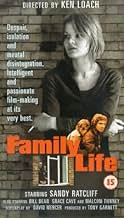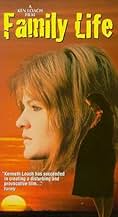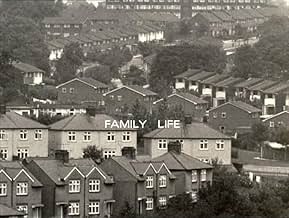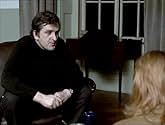A family is shattered over the daughter's forced abortion. As she rebels against her family and their traditional, authoritarian, typical-of-the-time norms, she is hospitalized and otherwise... Read allA family is shattered over the daughter's forced abortion. As she rebels against her family and their traditional, authoritarian, typical-of-the-time norms, she is hospitalized and otherwise mistreated.A family is shattered over the daughter's forced abortion. As she rebels against her family and their traditional, authoritarian, typical-of-the-time norms, she is hospitalized and otherwise mistreated.
- Nominated for 1 BAFTA Award
- 6 wins & 1 nomination total
- Barbara Baildon
- (as Hilary Martin)
Featured reviews
As a teenager growing up in the 90s, I experienced some of the same frustrations as the girl in this story and was all too often categorized as a "problem" simply because the adults in my life were "doing the best they could" and therefore there has to be something wrong with me. I was luckier than the girl of this story, who's best hope for salvation is vanquished by a psychiatric bureaucracy that is too concerned about appearances to have the patience to be progressive in their ways and their thinking.
"Family Life" is a rarity. A film that does not get old but can serve as a lesson and a warning to future generations.
The film is based on one of Wednesday Plays' most remembered episodes "In Two Minds" also directed by Ken Loach and written by David Mercer and dealing with a girl named Kate, living under the constant psychological pressuring of her parents and after a forced abortion, let her mind drift toward schizophrenia. The film version starring Sandy Ratcliff is clearly a reworking on the same subject but also an improvement.
For one thing, I think the use of color makes the difference, while the original was in black-and-white and could effectively convey the documentary-like aspect especially with the constant reliance on interviews, it gave a rather nightmarish, almost horror-like tone like one of these archive footage or stolen image from medical centers, as unsettling as that video where scientists test the effect of LSD on a poor cat. It was still a powerful film and I couldn't believe Darren Aronofsky didn't base Sara's demise in "Requiem for a Dream" from the fate of poor Kate (played by Anna Cropper).
But "Family Life" is much closer to Cassavetes' "A Woman Under the Influence" (and Janice is indeed under the influence) and getting back to colors, the beige and pastel tones create a startling contrast between Janice's state and the dullness of the environment she was brought up in, a bourgeois little house whose conformity is too clean to fool us. It's indeed an ordinary environment, not the kind that would lead to any trauma or alienation but Loach deliberately emphasizes the normality to demonstrate how problematic it was, if not for the parents but for Janice or her generation.
The film opens with one of Loach's trademark, Janice (Sandy Raitcliff in her debut) talks a little about herself to her psychiatrist Dr. Donaldson (Michael Riddall). She's a pretty 19-year-old girl, with a boyfriend named Tim (Malcolm Tierney) and again it's less in the things she say than the way she does or what she doesn't say that we can have our few glimpses on her emotional troubles. The editing is uncertain since we never really tell when it's a flashback or not but the first part clearly establishes the confusion within her mind and the causes of her troubles: an abortion she didn't want to have.
From her parents' reaction we can see the tragic paradox, they ask her to behave responsibly but they treat her as an irresponsible girl who can't make up her mind. The point of Loach is to show that sometimes madness isn't something you're born with but with the reaction to an education that forces you to behave in a way that contradicts your own prospects in life, leading you to a point where you simply don't know where to go. The father is played by Bill Dean and the mother by Grace Cave and the tragedy is less in their constant blaming of Jan's behavior but the fact that they don't realize the 'gaslighting' effect on her already fragile psyche.
Mrs. Baildon is certainly the most memorable character, so conservative it's scary, when she visits the doctor she deplores that his secretary calls his by his first name, which should be the least of her concerns. When the father is asked to talk about sex, he eludes the question in a way that confirms this isn't exactly the cement of his marriage. In a way, he did also conform to his wife's values. Taken separately, the parents become more approachable, almost as fragile as their daughter, in fact it's only when they're together that they form that 'two-headed' monster that Jan can't fight alone, leading her to the only viable solution: medical treatment. I didn't expect much from the medical world after witnessing how disastrous the welfare system worked in "Cathy Come Home" and indeed, the remedy proved even worse than the disease.
Yet the film's most brilliant moment came from a simple dinner scene with Janice's sister (Hilary Martin) and the verbal escalation that made me think of Ingmar Bergman's "Scenes from a Marriage". The scene isn't just magnificently directed and edited with that crescendo leading to the inevitable clash but also because it for once puts the parents in the accused box and for once they have to answer for their behavior. The mother tries to get away with it by proposing some jelly to her granddaughters and the father doesn't answer the content but the tone, asking for more respect because as a father, he's earned it. These usual rhetorical tricks highlight the sad reality of this family: when parents are too blind to see the disastrous effects of their education, any questioning would lead to a dialogue of the deaf.
Overall, the directing is forceful and Loach so at ease with his cinema-verité roots that some bits of surrealism were unneeded (like the blue painting scene). The realism culminates dramatically with the electroshock and this unforgettable conclusion where Janice is exposed to the medical students in an amphitheater like in a freak show. The film cuts abruptly as if the point was already made but maybe it should have emulated "In Two Minds" with the question sessions during the ending credits (I find the original ending more affecting).
"Family Life" invites us to question the crucial role of parenting in the way it shapes children's adulthood, parenting shouldn't be moulding but understanding. Generation gap is a reality that can't be dismissed and there are many sequences showing the youth of the 70s, long-haired rebels without a cause and I guess the point is to show that these kids live in a present and their parents try to educate them with values inherited from the past, consider the social evolution from the 20s to the 70s and you'll get the core of that lose-lose situation and incidentally, Janice's tragedy.
The additional of colour if anything actually makes the film look drabber, perfectly complementing the heroine's downward slide into a listless & resigned zombie doped up to the eyeballs on tranquillisers. You only have to listen to the heroine's ghastly mother talking non-stop and never listening where the poor girl's problems really originated.
The famous Loach style was already well in evidence, with all that spontaneity achieved by shooting such a vast amount of footage that one day the Arriflex burned out. Seen after fifty years it's also poignant that Sandy Ratcliffe like Carol White eventually came to a sad end.
This film does have some touching moments but, alas, the ending is not a happy one. Which is especially a shame as the film does occasionally allow a faint glimmer of hope shine through.
Did you know
- TriviaDirector Bille August cites "Family Life" as one of his greatest influences.
- Quotes
Mrs. Baildon: Well, this is the thing that baffles me, Doctor, um, she really was quite a model child, she was tidy, in fact, I used to go into her bedroom some mornings and it-it was so tidy, it really didn't look as if anyone had been in there.
- ConnectionsFeatured in Aquarius: Gnome Sweet Gnome/Family Life/The Great Waltz (1972)
- How long is Family Life?Powered by Alexa
Details
- Release date
- Country of origin
- Language
- Also known as
- Porodični život
- Filming locations
- Shenley, Hertfordshire, England, UK(mental hospital)
- Production companies
- See more company credits at IMDbPro
Contribute to this page















